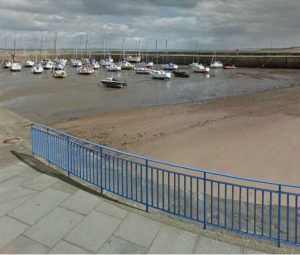POLICE Scotland have been accused of breaching protocol after they informed a man by phone that his brother was dead.
Wayne Everett reported his brother, Darran, missing and received a call from police asking for details about tattoos.
Shortly afterwards, Wayne, was told by phone that his brother’s body had been found and identified.
The force’s handling of the case is now being investigated by the Police Investigations & Review Commissioner.
Darran Everett, 25, left his home in Musselburgh, East Lothian, last Thursday – a week before he was due to become a father for the second time. His body was found on a nearby beach the following day.
Unaware of the tragic discovery, his family waited until Saturday before reporting him missing.
Wayne told his local newspaper he was later contacted by police.
He said: “I was asked a number of questions about tattoos and so on and then I was informed later by phone that Darran was dead.
“They breached protocol by informing the family that way.
“There are a lot of questions surrounding what happened to Darran and we want answers.”
Mr Everett is originally from Newcastle but was living in Musselburgh with his partner and young son, and was expecting another child this week.
Superintendent Jim Royan of Lothians and Scottish Borders Division said: “Police in East Lothian attended at Musselburgh Harbour on Friday, October 13, where the body of a man was recovered.
“The death is currently being treated as unexplained and a report will be sent to the Procurator Fiscal.
“Following a review of the circumstances leading to this incident, Police Scotland has referred the matter to the Police Investigations & Review Commissioner. We will provide them with all the necessary assistance they require during their investigation.”
Asked today if the investigation would look at police informing the family of the death by phone, a spokesman said they were not able to comment. The force also declined to comment on the family’s claim that this was a breach of protocol.
Police Scotland’s Standard Operating Procedure, published in July this year, states ‘The investigation of a death whilst routine to police, will have a tremendous impact on the family of the deceased.’
It continues: ‘In addition to police attendance at the locus of a death, often officers are involved in the initial notification of a death which was not expected.
‘The initial contact with the family will undoubtedly lay the foundations for the relationship during the enquiry.
‘Officers must act professionally and responsibly at all times and remain approachable.’
A spokeswoman for the Police Investigations & Review Commissioner (PIRC) confirmed they were investigating following Darran’s death.
The spokeswoman added: “The investigation will focus on police contact with the man in the days prior to his death.
“The matter has been referred to the PIRC by the Crown Office and Procurator Fiscal Service (COPFS) and a report on the Commissioner’s findings will be submitted to the COPFS in due course.”



